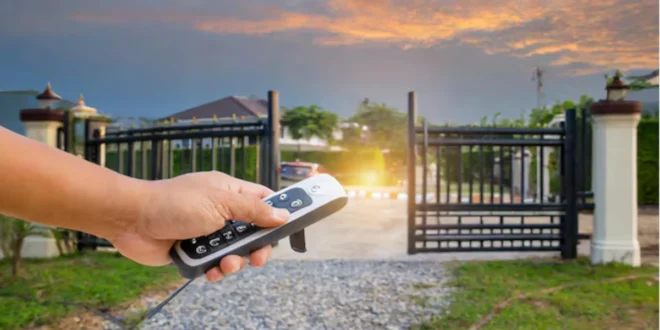Remote Door Openers: Transforming Access Control for Smart Homes
In today’s fast-paced world, technology has reshaped the way we secure our homes, manage access, and handle everyday tasks. Among these advancements, the remote door opener has emerged as a revolutionary tool, allowing homeowners and business managers to operate doors from a distance, adding an unprecedented layer of convenience and security. This article delves into everything you need to know about remote door openers, from their types and benefits to the latest technology trends, installation tips, and security implications.
Introduction to Remote Door Openers
A remote door opener is a device or system that enables the user to open or close doors without physical contact with the door itself. This functionality is achieved through wireless communication technology, like Bluetooth, Wi-Fi, or radio frequency (RF), allowing users to control access from anywhere—often through a mobile app or dedicated remote control. In today’s context, remote door openers are not only a matter of convenience; they represent a growing trend towards smart, interconnected home and office environments where ease of access meets advanced security.
Types of Remote Door Openers
- Garage Door Remote Openers
Garage door openers are among the earliest and most widely used remote door systems. Traditionally, they operate via RF and are often controlled by a dedicated remote. Modern garage door openers have evolved to include Wi-Fi connectivity, allowing control through smartphone applications, voice assistants, and even integration with home automation systems. - Automatic Sliding Door Openers
Commonly found in commercial settings like malls, airports, and hospitals, automatic sliding door openers use motion sensors to detect movement and open doors. When integrated with remote control functionality, they allow businesses to control access more efficiently, enabling or restricting entry as necessary. - Smart Home Door Locks with Remote Access
Smart locks provide both keyless entry and remote access to residential and commercial properties. These locks often include Wi-Fi or Bluetooth functionality, allowing users to lock or unlock doors remotely, manage user permissions, and monitor access history. - Industrial and Commercial Remote Access Systems
For larger commercial spaces, remote door openers are paired with access control systems to regulate entry across multiple points. They often integrate with security features like cameras and motion sensors, providing centralized control for better safety and operational efficiency.
Key Benefits of Remote Door Openers
- Enhanced Security
Remote door openers, particularly those with smart capabilities, significantly bolster security. Many systems allow real-time monitoring, access tracking, and alerts for unauthorized access attempts. With two-factor authentication and user management, they also ensure that only authorized individuals have access. - Convenience and Accessibility
Remote door openers make everyday life easier, especially for homeowners with physical limitations or for busy business settings. With the simple press of a button, doors can be opened, closed, or locked from virtually anywhere. - Energy Efficiency
By controlling when doors open and close, remote door openers can contribute to improved energy efficiency. Doors that are inadvertently left open can lead to higher heating or cooling costs; automated doors solve this by ensuring they remain closed when not in use. - Integration with Smart Home Ecosystems
Smart Smart Lock System are compatible with other smart home devices, like lighting systems, security cameras, and alarm systems. This integration allows users to create a more cohesive and convenient home experience, using a single app to manage multiple aspects of their home environment.
Technologies Behind Remote Door Openers
- RF Technology
Radio Frequency (RF) technology is the backbone of traditional remote door openers, especially for garage doors. Operating on dedicated frequencies, RF-based openers are effective at short-range control. However, they lack the sophisticated security and control features of newer smart systems. - Bluetooth Connectivity
Bluetooth-enabled Smart Lock System are highly convenient for short-range control. They allow users to control doors using a smartphone without the need for an internet connection, offering a reliable option for users looking for simplicity and security without additional setup. - Wi-Fi-Enabled Systems
Wi-Fi technology in remote door openers allows for long-range control, enabling users to manage access from any location with an internet connection. Many Wi-Fi-enabled systems come with mobile apps that offer real-time monitoring, notifications, and access logs. - NFC and Biometrics
Some high-end Smart Lock System incorporate NFC (Near Field Communication) or biometric scanning, adding extra layers of security. NFC-enabled systems allow users to unlock doors by simply tapping their smartphones on the sensor, while biometric options can include fingerprint or facial recognition for a personalized security experience. - Integration with IoT
The Internet of Things (IoT) has taken Smart Lock System to the next level, allowing seamless integration with various smart devices. Users can pair their remote door openers with cameras, thermostats, and other smart devices, creating a truly connected and responsive environment.
How to Choose the Right Remote Door Opener
When selecting a remote door opener, several key factors should be considered:
- Type of Door and Setting
Whether it’s for a residential garage, a commercial office, or an industrial warehouse, the type of door plays a significant role in determining the suitable remote opener. Different openers are designed for different door types, so choosing one that aligns with the specific setting is essential. - Range and Connectivity
Depending on your needs, the range and connectivity options are critical. If you need remote access from afar, opt for a Wi-Fi-enabled system. For short-range access, Bluetooth or RF models may be sufficient. - Security Features
Security is paramount when it comes to Smart Lock System. Look for models with strong encryption, two-factor authentication, and access logs. Advanced security features ensure that only authorized users can gain entry, reducing the risk of unauthorized access. - Compatibility with Other Smart Devices
Smart homes are becoming increasingly interconnected. If you have a smart home system, select a remote door opener that can integrate with existing devices. Compatibility with Alexa, Google Assistant, and Apple HomeKit can make managing your home environment smoother. - Ease of Installation
Some Smart Lock System require professional installation, while others are more DIY-friendly. If you’re looking for a quick setup, consider a model that offers easy installation. For complex security or access control needs, hiring a professional might be worthwhile.
Installation and Maintenance of Remote Door Openers
- Professional vs. DIY Installation
While some Smart Lock System are easy to install and may come with step-by-step instructions, others may require professional installation, especially in commercial or industrial settings. Professional installation can ensure that the system is configured correctly and integrates with existing security systems. - Regular Maintenance
Regular maintenance is essential for any Smart Lock System to function effectively. For garage doors, it’s important to inspect the opener and lubricate moving parts periodically. Smart locks should have their batteries checked and replaced as necessary, while all devices should be updated regularly to ensure security patches are in place. - Troubleshooting Common Issues
Like any electronic device, Smart Lock System can encounter issues. Common problems include connectivity issues, battery failures, and software bugs. Many manufacturers provide troubleshooting guides, and in some cases, customer support is available for more complex issues.
Future Trends in Remote Door Opener Technology
The future of remote door openers is promising, with several technological trends on the horizon:
- Enhanced AI and Machine Learning
As artificial intelligence (AI) continues to advance, future Smart Lock System may incorporate machine learning to detect unusual activity or recognize specific users based on behavioral patterns. This level of personalization and security could revolutionize how we interact with access systems. - Voice-Activated Access
While some Smart Lock System already integrate with Alexa and Google Assistant, voice-activated access is expected to become more widespread and sophisticated, enabling seamless and hands-free control in both residential and commercial settings. - Increased Integration with Biometric Security
Biometric technology is poised to become a mainstream feature in Smart Lock System, especially as facial recognition and fingerprint scanning technology improve. These technologies provide a high level of security while eliminating the need for physical keys or codes. - Sustainable and Energy-Efficient Designs
The trend towards sustainable living is impacting the design of smart devices, and Smart Lock System are no exception. Solar-powered models, energy-efficient designs, and materials with low environmental impact are likely to be integrated into future systems. - Blockchain for Enhanced Security
Some innovators are exploring blockchain technology as a way to secure access systems. Blockchain’s decentralized and immutable ledger could add an extra layer of security, preventing unauthorized access by maintaining a secure log of entries.
Final Thoughts: Is a Remote Door Opener Right for You?
Smart Lock System have rapidly evolved from simple convenience tools to sophisticated devices offering advanced security, accessibility, and integration capabilities. Whether you’re considering one for a residential or commercial application, understanding the various types, features, and technologies available can help you make an informed decision.
Investing in a Smart Lock System can elevate both the functionality and security of your space. As technology continues to advance, these systems will only become more capable, further simplifying and securing our lives.
Frequently Asked Questions (FAQs)
How does a remote door opener work?
A remote door opener operates by using wireless technology—such as Bluetooth, Wi-Fi, or RF—to allow users to open and close doors from a distance. It typically involves a transmitter and receiver, where the transmitter sends a signal to unlock or open the door, giving you control without needing physical keys or proximity.
Are remote door openers secure for home and business use?
Yes, remote door openers can be very secure, especially when they include features like two-factor authentication, encrypted connections, and user-specific access logs. Models that integrate with smart home systems often provide extra security measures, making them safe for both residential and commercial use.
Can remote door openers be installed on any type of door?
Most remote door openers are versatile and can work with various door types, including garage doors, sliding doors, and standard home doors. However, it’s important to choose a model suited to your door type and setting. Some doors may require specialized hardware or professional installation to ensure optimal performance.
What are the main advantages of using a remote door opener?
Remote door openers offer convenience, enhanced security, and energy efficiency. They make it easier to manage entry and exit without being physically present, monitor access remotely, and save energy by automatically closing doors after use. They’re also compatible with smart home systems, adding more value and functionality.
Do I need Wi-Fi to use a remote door opener?
Not all remote door openers require Wi-Fi. Some operate using Bluetooth or RF, which do not need an internet connection for short-range control. However, if you want to access and control your doors from a distance, a Wi-Fi-enabled model is usually recommended for remote monitoring and extended functionality.
How often should I maintain or service my remote door opener?
Regular maintenance is key to ensuring a remote door opener’s longevity and reliability. For basic models, check batteries, clean sensors, and ensure firmware updates periodically. More complex systems with moving parts, like garage door openers, may require annual servicing to lubricate parts and check for potential issues.
 Touch Blog
Touch Blog



